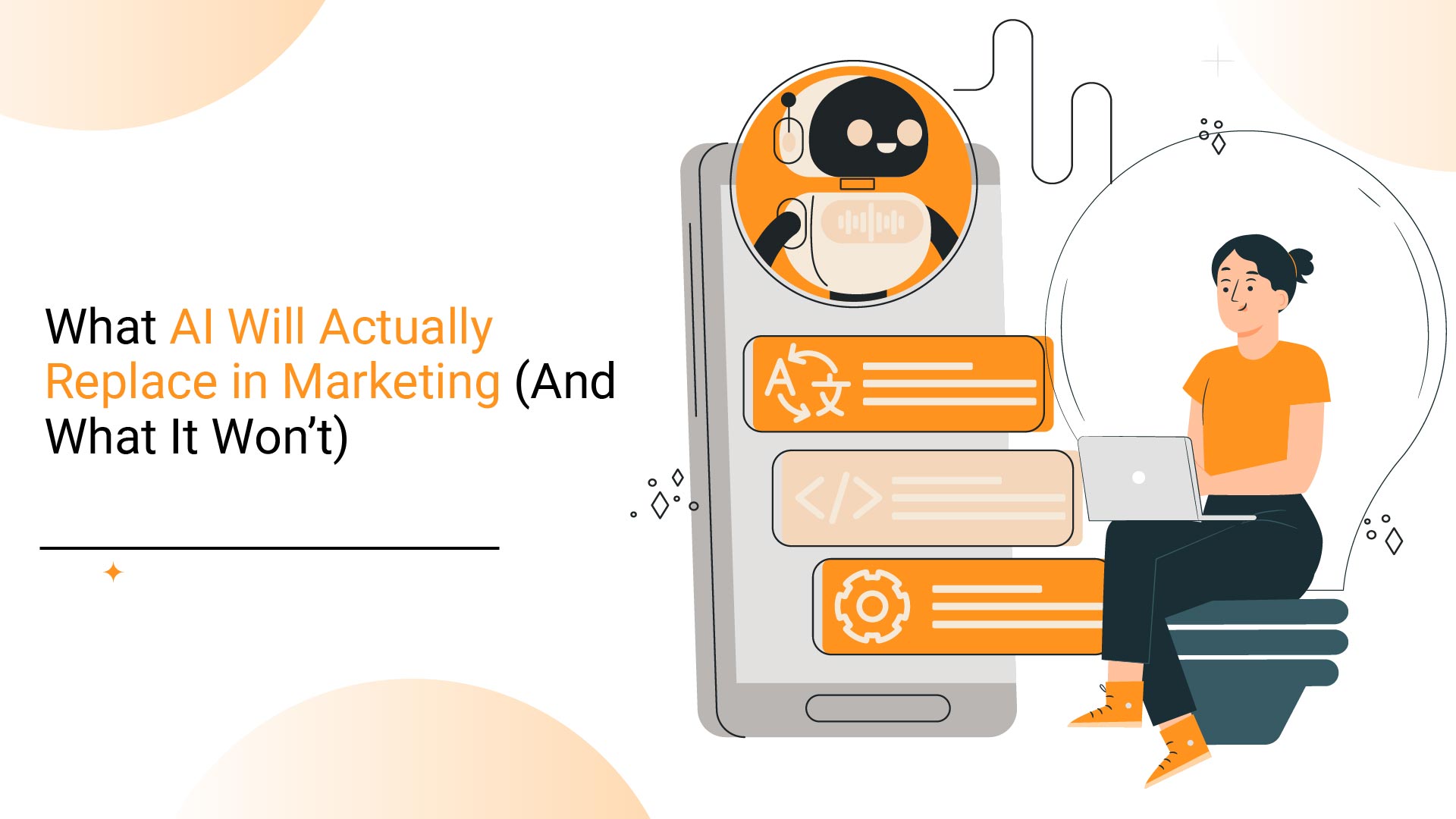

marketing artificial intelligence
What AI Will Actually Replace in Marketing (And What It Won’t)
What AI Will Actually Replace in Marketing (And What It Won’t)
We’ve all seen the headlines for quite a while now “AI is coming for your job.Marketers beware.”
It is certainly true that AI is reshaping the marketing landscape faster than most of us anticipated. But beneath the fear and the hype, lies a more nuanced truth. AI isn’t here to replace marketers, it is here to transform how we work, refocus our roles, and rewire what marketing teams look like in the future.
As the founder of a strategic marketing consultancy, I’ve watched this transformation unfold up close, with clients, teams, and tools. What AI is replacing isn’t the marketer, it’s the manual, repetitive, low-leverage tasks that have long held us back from what we do best: thinking strategically, connecting authentically, and creating with purpose.
So let’s separate the noise and fear from the real shift. Here’s what AI will (and won’t) replace in marketing. Here goes!
What AI Will Replace
1. Repetitive Content Generation
AI tools like ChatGPT, Jasper, and Copy.ai have already proven they can crank out blog drafts, social captions, product descriptions, and even SEO meta tags at speed.
But, that doesn’t mean your content team is obsolete. It means the bar is rising. AI can help you scale baseline content creation, test variations at lightning speed, and optimize for performance, freeing up your human writers to focus on higher-level messaging, brand voice, and storytelling.
2. Data Cleaning and Segmentation
Ask any marketer what eats up time behind the scenes, and you’ll hear about data wrangling. Merging spreadsheets, updating CRM fields, removing duplicates. These are tasks ripe for automation. AI-driven platforms like Segment, Adobe Real-Time CDP, and even built-in CRM tools are making it easier to unify customer data and dynamically segment audiences based on behavior, demographics, and engagement.
This means faster campaign execution, smarter targeting, and less time formatting pivot tables.
3. A/B Testing and Optimization
AI excels at pattern recognition. It can run hundreds of test variants simultaneously, spot what’s working, and make real-time adjustments that would take a human team days or weeks. From subject lines to ad creatives to landing page layouts, machine learning is quietly becoming your most efficient conversion rate optimizer.
Marketers who used to run one or two A/B tests per campaign can now oversee dozens with AI doing the heavy lifting and surfacing insights in real time.
4. Marketing Ops and Workflow Automation
Scheduling campaigns. Routing approvals. Triggering follow-up emails. These tasks are mission-critical but mind-numbing. AI-enabled tools like Zapier, HubSpot workflows, and ActiveCampaign are automating these back-end processes, allowing leaner teams to deliver more with fewer bottlenecks.
The result? Fewer “Did you send the test email?” moments -- and more time for strategy.
What AI Won’t Replace
1. Strategic Thinking and Brand Positioning
AI can remix the past, but it can’t invent the future. Strategic marketing decisions, how to enter a new market, reposition a legacy brand, or differentiate in a crowded space require human intuition, business acumen, and cultural context.
These are judgment calls, not pattern matches. They demand an understanding of nuance, timing, and risk tolerance. AI can inform decisions, but it can’t make them in a vacuum.
2. Emotional Intelligence and Relationship Building
Marketing is about people. And while AI can mimic tone and empathy to an extent, it can’t build relationships, earn trust, or navigate complex human dynamics the way real marketers can.
Whether it’s nurturing client relationships, aligning internal teams, or managing agency partnerships, emotional intelligence remains one of the most valuable (and irreplaceable) marketing skills.
3. Creativity with Context
Yes, AI can generate ideas. But creativity in marketing is rarely about generating more ideas. It is about generating the right ones, rooted in audience insight, cultural relevance, and brand alignment.
The most effective campaigns evoke emotion, take creative risks, or tap into moments that matter. AI may suggest catchy slogans, but it won’t know your customer’s inside joke or your founder’s origin story. That’s where marketers still shine.
4. Ethics, Compliance, and Brand Safety
As marketers adopt AI tools, they’re also responsible for ensuring outputs are ethical, compliant, and aligned with brand values. AI doesn’t know your industry’s legal nuances or your company's non-profit commitments. It doesn’t understand tone sensitivity in a time of crisis.
Humans must remain in the loop to vet, approve, and guide AI usage within thoughtful guardrails. As with any powerful tool, oversight isn’t optional.
The new marketing org will be augmented, not replaced
So what does this all mean for marketing teams? It means we’re entering an era where AI acts as a force multiplier, not a headcount reducer. The most effective teams will be those that learn to collaborate with AI, delegate the right tasks to machines, and evolve their roles to focus on creativity, leadership, and strategy.
Expect to see:
- More hybrid roles that combine creative and technical skills (think: content strategists who know prompt engineering)
- Lean, nimble teams that produce more output per head
- Less time spent “doing,” and more time spent directing, analyzing, and innovating
Final Thoughts
AI is not the end of marketing but the beginning of a new chapter. This is one where marketers trade busywork for bold thinking. One where the tech doesn’t overshadow the team but amplifies what they’re capable of.
The future belongs to teams who embrace this shift, not fear it. Because when you stop seeing AI as a threat, and start seeing it as a teammate, everything changes.

Katie Samuelson
Katie Samuelson is a strategic marketing executive with over 12 years of experience driving growth and innovation for mid-stage and high-growth B2B SaaS companies. She is the founder of Growth Path Consulting Group.
With deep expertise in demand generation, product marketing, and revenue strategy, Katie has successfully scaled businesses, built high-performing marketing teams, and led impactful go-to-market initiatives. As a seasoned VP of Marketing, she has played a key role in doubling revenue while overseeing both sales and marketing efforts.
Growth Path Consulting is a firm that specializes in helping businesses, particularly startups and small to mid-sized companies, achieve sustainable growth. They offer fractional services, meaning they provide marketing leadership without the full-time commitment of a traditional CMO. This allows businesses to access high-level marketing expertise while managing costs effectively. Growth Path Consulting focuses on strategic, agile, and results-driven approaches tailored to each client's unique needs, helping them validate product-market fit, develop go-to-market (GTM) strategies, and execute marketing plans with precision.




